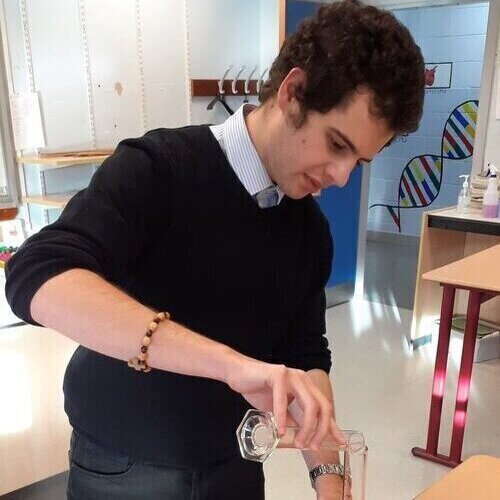Tell us a little bit about your background...
I was born and raised in Pécs (a city of a similar size to Dundee) in South-West Hungary, where I finished both primary and high school. In Hungary traditionally there is a big emphasis on Mathematics and Physics education and it is a very competitive environment for talented students. To me, it was natural to go to Maths competitions from the age of 7, and to Physics as well, after I started to learn the subject. It turned out that I am good at both, but much better in Physics, so I studied a specialised Maths-Physics course at high school (which was similar to what is called grammar school south of the border). Being taught by excellent teachers there and participating in every possible extracurricular activity available both in Pécs and Budapest, I was among the most successful students of my year group in the country. For students doing well in the national competitions it is common to apply to Oxbridge, and so did I. From 2017 I studied Physics in Oxford. There I had to realise that academia is very different from the way I like doing physics, and checking all the options teaching seemed the one I thought I would enjoy the most. I finished my undergraduate course this June, and now I am here.
What inspired you to become a teacher?
As I said, I realised during my Physics undergrad, that I do like the subject, but I do not like academia. At the high school level, I can see the fundamental nature of science and the way it works. At the university level, if one is not careful enough it is easy to get lost among equations and overlook reality. I also consider teaching an extraordinary opportunity to influence the world positively. There are more than enough physicists all around the world, but the lack of physics teachers is a problem almost everywhere. Finally, my experience in working with young people has been good so far. I hope this will not change during my placements and I will see teaching as the best option for myself after the end of this year.
Did you have a favourite teacher when you were growing up?
I was lucky enough not to be taught by bad teachers through my studies. Of course, my high school physics teacher influenced me the most. He enabled me to reach as far as Oxford and to later see teaching as a valid career choice. We still keep in touch and meet regularly when I go home. It would be unjust not to mention here the retired physics teacher as well who used to go back to my primary school to lead an extracurricular physics club. He started me off on the road to enjoy physics and I loved his teaching style.
Why did you select the University of Strathclyde?
When I was looking for teaching courses I first had to choose a country to study in. Scotland was not an obvious choice at all, but seeing how the system works in Hungary and England I decided to come here. To me, the Scottish teacher training system seems clearer and a higher standard than what I would get in the other two countries. To be honest, before applying I did not even know about the existence of Strathclyde University. Fortunately, I had my interviews in February, before the madness of Covid, thus I could visit the universities I applied to. The atmosphere of Strathclyde was special, I enjoyed my visit here a lot. I did not feel the same after my other interviews so that was the decision-maker. Unfortunately, I do not get the full Strathclyde-experience now, but I am still happy with my choice.
Did you seek any support during the application process?
Not really. I have a lovely sister, who double-checked my application and did not let me leave any mistakes in my Personal Statement and UCAS application. Otherwise, I did not need support with the application.
What would be your advice for people considering taking the PGDE course at Strathclyde?
First of all, I would like to encourage them to do so! Teachers are needed in this country and elsewhere too. It is important to be passionate about teaching and interested in how it works. The PGDE does not prepare you to go into a class, say things about your subject confidently and then leave. It prepares you to see the individuals and be open to them. In that way, you will be able to help them develop both in your subject but more importantly as complex human beings. Furthermore, I have a piece of general advice, which is not to worry and stress too much about anything. This is a supportive environment, your tutors are always there to help you and I think you have to try hard to mess things up. As long as you follow the guidance of the university there will be no problem.
Have you had to overcome any challenges in your time here?
Fortunately, my time in Glasgow has been great so far. It can be challenging to move to a new place but we get on well with my flatmates who made the transition easy to me. The university is also challenging, yet I did not feel overwhelmed by the workload. We were told that our first placement is going to be tiring and tough but I believe I am prepared to face it. The only thing I am afraid of is the coming winter. I was amazed by how beautiful September was in Scotland, however, I see days getting shorter and in the darkness it is harder to keep my good mood. I trust our flatmates to help each other through winter as good conversations can cheer up dark days.
What do you think of the support available?
To me the available support seems to be more than enough. I turned to my subject tutors to ask for help a couple of times, but most of the times what we were already given was sufficient to go on. I have been informed about several ways the university supports its students, which I do like and think to be important. The one I particularly esteem is the possibility to contact with university staff via Zoom if you have to self isolate and indeed you feel isolated. I did not have to self-isolate, and as I said before I have not had many difficulties so far, but I see the supporting net and I do appreciate it.
What were the most enjoyable parts of your degree?
Looking back at my year at Strathclyde, two remarkably enjoyable activities come to my mind. I loved teaching at the end of my second placement when I felt that things were falling into place, and I was doing a decent job.
Secondly, I had great flatmates at James Goold Hall. The four of us worked a lot together, from discussing classroom management techniques to writing lesson plans together. We also had private chess tournaments and played (over the board!) almost every day.
Tell us about your new role and what your job is like...
Feeling homesick throughout most of my time in the UK, I decided to come closer to Hungary after my PGDE. My initial plan was to take a gap year before starting teaching; however, I changed my mind thanks to a mentor teacher at a placement school. In the academic year of 2021-22, I taught Mathematics and Chemistry at the American Academy in Bratislava. This was a tiny private school in the Slovak capital with only a handful of teachers and around fifty students. Although I am technically a Physics teacher, I could successfully cope with teaching other subjects.
Starting in Autumn 2022, I moved to Budapest to teach Physics at a Grammar school. Now I work in a classic school environment, not the almost family-like community I got used to in Bratislava. I feel I benefit greatly from interactions with more colleagues and from having access to an excellent Physics Laboratory.
How do you feel your degree helped prepare you for this role?
The American Academy was focused on project-based learning and cooperative learning methods. Many teaching methods I learned in Scotland were directly transferable and effective in this environment. I also learned during my PGDE where to look for good ideas, so I was always able to bring something new to the classroom.
In Budapest, I work with more conservative methods, but there are little tricks I picked up during my placements that help me day-to-day.
What advice would you give to someone who is considering working in a similar role to yours?
As an ordinary teacher at an ordinary state school, the only advice I should give to others is not to be discouraged by non-ideal conditions. If one can keep their eyes open and find the beauty of working with young people, it is highly rewarding and enjoyable.

